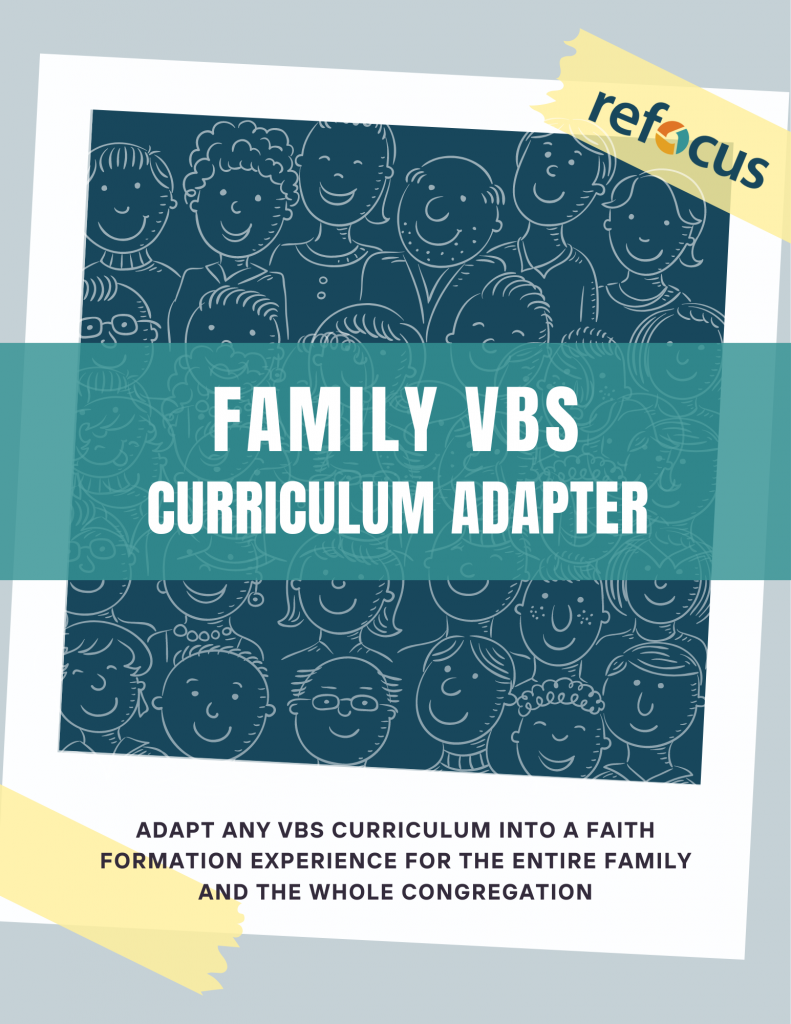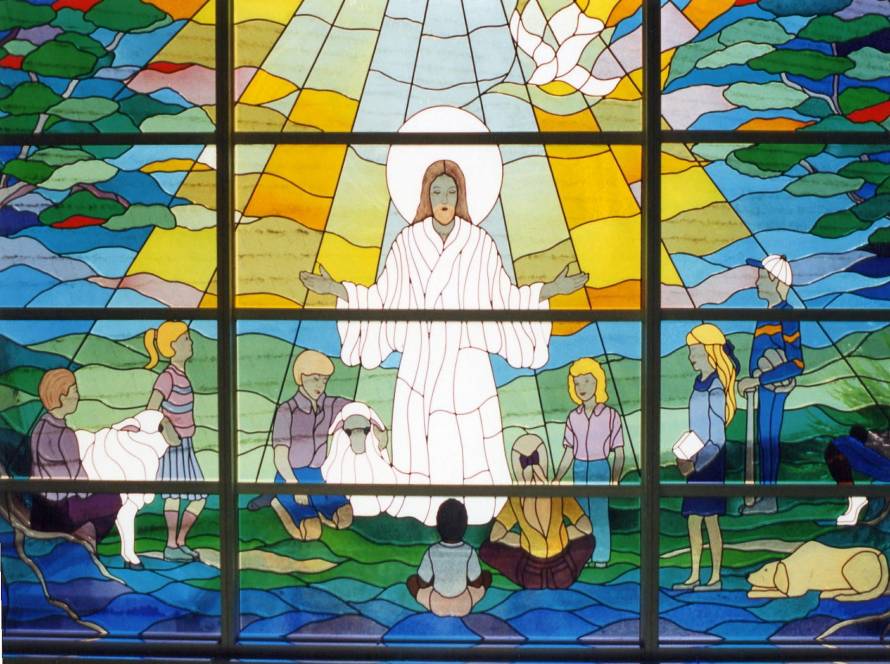So, why should a church “do” Intergenerational Ministry?
Let’s be honest – for most churches, incorporating all ages into a worship community with times and spaces to learn, worship, and grow together doesn’t come naturally. And even when you do events where all ages can attend, everyone ends up clumping into age-specific groups and hanging out with people they already know. Why put in the effort to go against the tide and people’s natural inclinations?
You may have asked these questions. You may have been asked these questions. And there is much to say, more than a blog can fit, but here are seven important reasons for us to make the effort to connect generations in meaningful relationships for lifelong discipleship.
1. Because it’s the Discipleship Model in Scripture.
Generational Discipleship, the passing of faith from one generation to another is modeled for us all through the Bible. In Psalm 145:4 “One generation shall commend your works to another, and shall declare your mighty acts.” and in Psalm 78 – The psalmist explains the importance of testifying about God’s works to the next generation so they would remain in the faith and not turn away a.k.a. generational discipleship. And we see examples of this through the narratives of Scripture. Below are just a few examples of how faith was passed between generations and often back again in both the Old and New Testament.
- Eli and Samuel (I Samuel 3) and then Samuel to Eli
- Timothy and his mother and grandmother AND Timothy and Paul (2 Tim. 1:5)
- Naomi and Ruth (The book of Ruth)
- Moses and Joshua (Deut. 31)
- Elizabeth and Mary (Luke 1:39-80)
2. Because the research tell us we should .
The Sticky Faith group at Fuller Youth Institute have studied the reasons young people walk away from the church, looking for a “silver bullet” for churches and parents to use to keep that from happening. While there was no “silver bullet” churches that encouraged intergenerational connections and worship and youth that felt involved and connected to the larger church had a much greater chance of remaining in church post high school. (The findings can be found here). Additionally, they found that time spent talking and living faith in the home was the biggest indicator of a faith that sticks in kids. According to Jim Burns at HomeWord ministries, kids that talk about their faith at home with mom and dad have a 80% chance of remaining in church once they leave the home.
3. Because Faith Formation is a Lifelong Process; we need each other grow.
By the age of 9 a child has already formed his or her basic moral foundation and by age 13 they’ve come to an understanding about God, His love, and eternity. But, we don’t stop there. According to research done by James Fowler on faith formation, our faith continues to transform and grow throughout our lives as we move through stages of reflection, resolution, and redemption. And guess what? We need each other for that! In a study published in 2017, researchers found that three things are necessary for intergenerational learning, 1. There must be space to learn about one’s own generation with other generations, 2. All generations must act as learners and teachers at the same time, and 3. The learning must motivate participants towards in a particular way. (Source). In church, the “way” is Jesus and the “learning” is discipleship.
4. Because Time marches on
Studies show that on average, kids will spend about 24-40 hours a year at church. Contrast that with the estimated 2,000-3,000 hours they will spend at home or with their parents (For more on this, click here). If we want faith to be a significant, ongoing part of their lives, we need to connect the home with the faith community through meaningful relationships and ongoing discipleship.
5. Because Parents need the Church (the people not the building).
Most parents of elementary-aged kids today grew up in churches that had age-segregated, traditional models. Many times faith was compartmentalized and not talked about at home. Because of that, parents don’t know how to talk about their faith or worship with their children. They need help. They need supported. They need ministry. They need their faith community to do what they promised on baptism or dedication day and walk with them as they raise their kids in the faith.

6. Because the Next Generation needs the Church (the people not the building).
An average child will be engaged in some kind of media (television, video games, social network, etc.) for 40 hours a week. Remember that statistic about church? At most, 40 hours a YEAR at church. The messages they receive all week long cannot be addressed in one hour on a Sunday morning. Kids need a church family that is engaged in their faith walk in the everyday so that faith is not a “Sunday thing” but a life thing. Relationships must be cultivated in the everyday, not just in the schedule times. Where? I always tell churches to start in two places: Prayer and Service. These things are not age-bound and they connect us at a deeper level that just sitting side-by-side in a pew or passing each other in a hallway.
7. Because our Great Commission is to Make Disciples
The final commission left to the church by Jesus was to “Go and make disciples.” Discipleship goes beyond church membership, service attendance, or biblical assent. Being a disciple means being a follower and imitator of Christ and making disciples means leading others to do the same; to know who Jesus is and to know what it means to follow Him. As Paul says, “Follow me as I follow Christ.” Generational discipleship calls us to bridge the generational gap and strive towards a community that truly worships, learns, serves, laughs, cries, and grows together.
This is not an exhaustive list. It’s a starting point. And this list is broad but not specific. Your own community has its own unique reasons why connecting generations in relationships for discipleship is so important. If you are interested in continuing this discussion, I invite you to reach out. We can schedule a Zoom call (here) and talk about how best to create a community marked by generational discipleship in your church. Begin and the begin
REFOCUS MINISTRY COHORTS
Have you ever been to an eye doctor and they flip different lenses in front of your eyes and say, “Better or worse?” on repeat. And finally you land on a set of lenses that helps the whole world become clearer and once you’ve seen it, you’ll never go back?
The ReFocus Ministry cohorts provide an experience like that; a new lens through which to see the world of church and ministry, one that answers our call to make disciples. 12-weeks of training, 1 year of coaching, and a lifetime of ReFocus resources. Ready to learn more? https://refocusministry.org/speaking-coaching/ (ReFocus Ministry Cohort tab) or email christina@refocusministry.org.
VBS FOR THE WHOLE FAMILY? YES!

Vacation Bible School is often one of the highlights of the church year. It’s fun! It’s loud! It’s got snacks! But over the years, more and more churches have been wondering, “Has VBS run its course? Is it effective? Are we reaching our community?”
Let’s imagine a different kind of VBS.
Imagine the entire family moving through a faith experience together; playing games, building crafts, maybe even a short parent training on faith formation at home… all happening at one of your cherished church events – VBS!!
Now imagine a tool that helps make it all possible. Welcome to the Family VBS Curriculum Adapter!
This resource will go LIVE on Thursday, February 1, 2024. Keep an eye on our Facebook page and website for ways to purchase!
About the Author
Christina Embree is the founder and director of ReFocus Ministry. She holds a masters in ministry focused on Children, Youth, and Family Ministry and a doctorate in spiritual formation with a focus on age segregation and intergenerational ministry. In addition to coaching churches of multiple denominations and traditions all around the globe, Christina serves as the Minister of Generational Discipleship for the Great Lakes Conference of the Brethren in Christ and as a pastor at Plowshares Brethren in Christ in Lexington, Kentucky. She is widely recognized as a speaker and author in the areas of generational discipleship, intergenerational ministry, and family ministry. As the mother of three children, she is familiar with the challenges of faith at home and pastoral ministry. She along with her husband Luke share a love for the church, their community, and the global work of peace and restoration through Jesus.
Interested in having Christina visit your church, speak at your conference, or coach your team? Christina speaks on a wide range of topics related to children, youth, and family ministry with a unique focus on connecting generations for discipleship within your church. Her personalized approach allows you to pinpoint the needs of your community and gain the insight that you are looking for. Whether this is a volunteer team training and pastoral staff meeting or a ministerial conference, her experience and knowledge will help you determine the next step forward in creating lifelong disciples.




